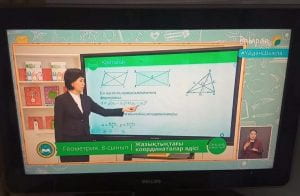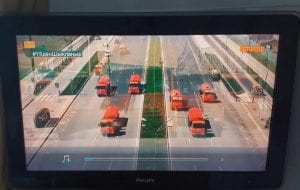<< Diary Project Nur-Sultan [1] Diary Project Nur-Sultan [3] >>
14 April 2020
On March 26 things began to evolve rapidly. It had been ten days since the announcement of the state of emergency. The number of people identified as infected with COVID-19 had risen from two cases (on March 13) to 111 cases, and the first causality had been reported. From March 28 onward, the lockdown was tightened in Nur-Sultan: people were limited in movement from their residences, allowed only short visits to grocery stores and pharmacies, or to travel to medical appointments and offices. The government announced a curfew for teenagers outside without the presence of a guardian.
I think that it was from this moment that people began to realize the danger of COVID-19. It was also from this moment that COVID-19 began to affect my daily life, namely through inducing a feeling of being confined within four walls. Yet more was to come. Two days later, on March 30, the government enforced harsh measures that were to continue until April 30. In Nur-Sultan City and Almaty, all enterprises and organizations were to suspend their work (with exceptions for central government bodies, healthcare organizations, groceries, pharmacies, and the media); all public transport was suspended; and monitoring of adherence to social distancing and ‘stay at home’ orders began. Violations would bring fines or detention.


As a person who considers freedom the greatest value in life, I strongly feel that COVID-19 limits my freedom more than I could have expected. It is also true that I am still free to decide whether to follow my routine or not, whether to force myself to finish the art course I signed up for or not, whether to spend the entire Saturday in bed or to finally finish my paper proposal. There is a choice. Moreover, if freedom is, as the Cambridge Dictionary defines it, ‘the condition or right of being able or allowed to do, say, think, etc. whatever you want to, without being controlled or limited,” then I do have freedom. This lockdown does not deprive me of freedom in this sense. I can complain about having to spend all day long in four walls or express these feelings in a post I write for a blog. I listen to my favorite song for the fifth time and sing along to it aloud, as I am doing it more often during these quarantine days. Yet, as much as I would like to convince myself that I still have the freedom to choose, I cannot ignore also understanding that I do not have it right now.
I cannot go for a walk in my favorite park although I want to very much. I cannot do the things I want to do when I want and where I want. I am free to organize my daily schedule the way I can, but not the way I want. I am still free to determine the direction of my life. The lockdown will be over in a few more weeks, and scientists will finally find a vaccine. However, right now I do not feel free. My freedom is constrained.
Although I feel personally constrained by these anti-COVID-19 measures, I do not blame anyone or anything aside from the set of circumstances that led to the pandemic. Kazakhstan’s hard response to COVID-19 may not be the best possible option in comparison to South Korea’s response, which avoided lockdowns and strict quarantines in favor of massive testing and contact tracing. It seems that Kazakhstan followed the Chinese model of anti-COVID-19 policy instead.
It is not the purpose of this entry to discuss which strategy is better, though. In regard to the Kazakhstani government’s anti-COVID-19 strategy, I support it. I stand by the claim that human life is the first priority during wars and pandemics. The tough measures the Kazakhstani government imposes to stop the further spread of the virus might work as they did in China, since the government responded to the virus relatively early, upon the discovery of the first registered cases in Kazakhstan.
Related:
Diary Project Nur-Sultan [1] :: Diana Kopbayeva (Kazakhstan)
Diana Kopbayeva works in the Department of History, Philosophy and Religious Studies, at Nazarbayev University, Nur-Sultan, Kazakhstan. She holds a Ph.D. in sociology from Newcastle University, UK (2019). Her doctoral project examined the current discourses of the nation in Kazakhstan (2013-2017) and focused on very recent initiatives and state programs, including the new notion of the Eternal Nation (Mangilik El ) that entails the government’s attempt to create a vision of an eternal nation-state where ethnic and civic nationalism co-exist, even as these discourses remain inherently in tension. Her research interests include nationalism, nation-building, discourses of the nation in post-Soviet territory.
* * *
The Teach311 + COVID-19 Collective began in 2011 as a joint project of the Forum for the History of Science in Asia and the Society for the History of Technology Asia Network and is currently expanded in collaboration with the Max Planck Institute for the History of Science(Artifacts, Action, Knowledge) and Nanyang Technological University-Singapore.
![[Teach311 + COVID-19] Collective](https://blogs.ntu.edu.sg/teach311/files/2020/04/Banner.jpg)